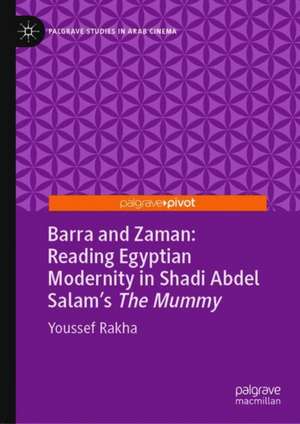Barra and Zaman: Reading Egyptian Modernity in Shadi Abdel Salam’s The Mummy: Palgrave Studies in Arab Cinema
Autor Youssef Rakhaen Limba Engleză Hardback – 17 dec 2020
| Toate formatele și edițiile | Preț | Express |
|---|---|---|
| Paperback (1) | 476.79 lei 6-8 săpt. | |
| Springer International Publishing – 18 dec 2021 | 476.79 lei 6-8 săpt. | |
| Hardback (1) | 482.74 lei 6-8 săpt. | |
| Springer International Publishing – 17 dec 2020 | 482.74 lei 6-8 săpt. |
Preț: 482.74 lei
Nou
Puncte Express: 724
Preț estimativ în valută:
92.38€ • 95.44$ • 76.89£
92.38€ • 95.44$ • 76.89£
Carte tipărită la comandă
Livrare economică 25 martie-08 aprilie
Preluare comenzi: 021 569.72.76
Specificații
ISBN-13: 9783030613532
ISBN-10: 3030613534
Pagini: 111
Ilustrații: XI, 111 p. 22 illus., 12 illus. in color.
Dimensiuni: 148 x 210 mm
Greutate: 0.3 kg
Ediția:1st ed. 2020
Editura: Springer International Publishing
Colecția Palgrave Pivot
Seria Palgrave Studies in Arab Cinema
Locul publicării:Cham, Switzerland
ISBN-10: 3030613534
Pagini: 111
Ilustrații: XI, 111 p. 22 illus., 12 illus. in color.
Dimensiuni: 148 x 210 mm
Greutate: 0.3 kg
Ediția:1st ed. 2020
Editura: Springer International Publishing
Colecția Palgrave Pivot
Seria Palgrave Studies in Arab Cinema
Locul publicării:Cham, Switzerland
Cuprins
Chapter 1: Sections 1-50.- Chapter 2: Sections 51-100.- Chapter 3: Sections 101-150.- Chapter 4: Sections 151-200.
Notă biografică
Youssef Rakha is a novelist, poet, journalist, and photographer who writes in both Arabic and English. His work has been widely anthologized and translated into many languages. Born, raised, and based in Cairo, Egypt, Rakha graduated from Hull University, UK, in 1998.
Textul de pe ultima copertă
“An electrifying, cubist portrait of a classic film’s place in the world. Youssef Rakha says that Shadi Abdel Salam’s The Mummy embodies 'a twilight zone of Egyptian modernity.' By writing about patriotism, grief, visual beauty, political entropy, colonialism, and sexuality, he brilliantly takes us into that modernity, that zone. Few people write about cinema with such zigzagging bravura or impertinent seriousness; not often do we get such a three-dimensional context for a film. This book will be as valuable to creative writers as it is to devotees of cinema or Egypt.” (Mark Cousins, film critic and director of The Story of Film: An Odyssey)
“Youssef Rakha magnificently takes us on an intellectually stimulating and highly entertaining cultural journey through the frustrations and joys of modern Egypt using Shadi Abdel Salam’s masterpiece The Mummy as a tombstone touchstone. As acerbic, exciting, and politically astute as listening to The Last Poets with Godard-esque jump cuts, this stylish text makes traditional critical analysis feel like tales from the crypt.” (Kaleem Aftab, author of Spike Lee: That’s My Story and I’m Sticking To It)
“An anecdotal and ultimately engaging meander through the imagined pasts and disjointed legacies of Egyptian history, setting out from and repeatedly returning to Shadi Abdel Salam's masterpiece.” (Tim Power, archaeologist and historian, author of The Red Sea from Byzantium to the Caliphate)
“Egyptian novelist Youssef Rakha captures the personal relationship with art that lies beneath all scholarly endeavor, but which too often gets lost in academic analysis.” (Kevin Blankinship, Brigham Young University, USA)
“Brilliantly introduced by Nezar Andary, this book is a work of creative nonfiction that approaches writing on film in a fresh and provocative way. It draws on academic, literary, and personal materialto start a dialogue with the Egyptian filmmaker Shadi Abdel Salam’s The Mummy (1969), tracing the many meanings of Egypt’s postcolonial modernity and touching on Arab, Muslim, and ancient Egyptian identities through watching the film.” (Youssef Rakha is a novelist, poet, and essayist who writes in both Arabic and English. His work is widely anthologized and translated into many languages)
“Youssef Rakha magnificently takes us on an intellectually stimulating and highly entertaining cultural journey through the frustrations and joys of modern Egypt using Shadi Abdel Salam’s masterpiece The Mummy as a tombstone touchstone. As acerbic, exciting, and politically astute as listening to The Last Poets with Godard-esque jump cuts, this stylish text makes traditional critical analysis feel like tales from the crypt.” (Kaleem Aftab, author of Spike Lee: That’s My Story and I’m Sticking To It)
“An anecdotal and ultimately engaging meander through the imagined pasts and disjointed legacies of Egyptian history, setting out from and repeatedly returning to Shadi Abdel Salam's masterpiece.” (Tim Power, archaeologist and historian, author of The Red Sea from Byzantium to the Caliphate)
“Egyptian novelist Youssef Rakha captures the personal relationship with art that lies beneath all scholarly endeavor, but which too often gets lost in academic analysis.” (Kevin Blankinship, Brigham Young University, USA)
“Brilliantly introduced by Nezar Andary, this book is a work of creative nonfiction that approaches writing on film in a fresh and provocative way. It draws on academic, literary, and personal materialto start a dialogue with the Egyptian filmmaker Shadi Abdel Salam’s The Mummy (1969), tracing the many meanings of Egypt’s postcolonial modernity and touching on Arab, Muslim, and ancient Egyptian identities through watching the film.” (Youssef Rakha is a novelist, poet, and essayist who writes in both Arabic and English. His work is widely anthologized and translated into many languages)
Caracteristici
An innovative work of creative nonfiction, to be read in one piece Draws on academic, literary, and personal material to forge a creative nonfiction approach to writing about film Examines Egypt's postcolonial modernity -- touching on Arab, Muslim, and ancient Egyptian identities -- through the lens of Shadi Abdel Salam’s The Mummy (1969), known in English as The Night of Counting the Years Written by acclaimed Egyptian novelist, poet, journalist, and photographer, Youssef Rakha










